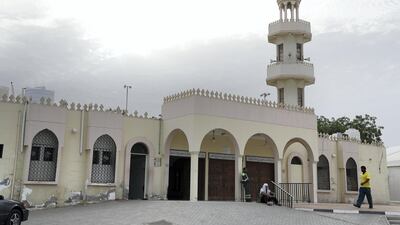The Kuwaiti Street market is the public epicentre of Ramadan in Ras Al Khaimah, and the Sheikh Salem bin Sultan Mosque sits at its entrance across the street from a 19th century fort and, around the corner, storefronts that glitter with golden medallions and sequinned dresses.
At the entrance to this market, the rich and the poor kneel and pray shoulder to shoulder before the mihrab of the Sheikh Salem mosque. Men enter under imposing arches of the front entrance. Women come in a discrete side entrance, escaping from the heat of the midday sun into the silence and cool of the mosque.
This neighbourhood was once home to renowned merchant and sailing families, and the fort, now converted into a museum, was home to the late Ras Al Khaimah Ruler, Sheikh Saqr bin Mohammed.
Today, the surrounding houses are shared by low-income families and men called bachelors who are, for the most part, middle-aged men supporting families overseas.
The mosque’s sole resident, Ibrahim Abdulrahman was once one such man. Today Mr Abdulrahman and his family live in the mosque, under a door to the right of the mosque’s arcade that says ‘Muezzin’s Room’.
For Mr Abdulrahman, the Sheikh Salem Mosque represents not only salvation of the soul, but also from the loneliness of the UAE bachelor life.
The Keralite, now 55, moved to the UAE in April 1982 to work at his brother’s cafeteria, selling chickpeas outside a women’s park. Eventually, he secured a job as a cleaner at the Awqaf.
But after years away from his wife and children, he could no longer stand to be apart and put in his resignation.
When his boss asked him why, Mr Abdulrahman explained that his humble job title did not permit him to sponsor his wife. The manager made arrangements so that Mr Abdulrahman could stay, and from that day forward Mr Abdulrahman was known on paper as a PRO. “So I could bring my wife,” said Mr Abdulrahman.
He continued to work as a cleaner and was granted the muezzin’s room at the Sheikh Salem mosque.
Over the decades, it has provided comfort for many others.
_______________
Read more
President announces new law affecting every mosque in UAE
Ten of the UAE’s most beautiful mosques to visit - in pictures
Mosques should be the centre of our communities
_______________
In Ramadan, 400 people will break their fast here daily and gather for taraweeh prayers offered led by the imam, Ahmed Abdulrahman. The Iraqi Imam, who was raised in Sharjah and Khor Fakkan, has led prayers here for 18 years. Prior to that, he served as the mosque’s muezzin for two years, before the call to prayer was replaced by live satellite transmission from Abu Dhabi’s Sheikh Zayed Grand Mosque.
When the imam first began his service here, Sheikh Saqr still attended fajr – or dawn - prayers, walking across the street from the fort, followed by his body guards. He wanted to pray amongst his people, as he had in his youth.
Of course, residents will tell you, the mosque where the sheikh had prayed decades earlier was not the same building, nor the same location.
There are two views on the history of a mosque. In some parts of the world, a mosque is believed to be nothing more than the physical structure where people pray. In Ras Al Khaimah, a building is considered secondary to its function. And so people consider the Sheikh Salem mosque much older than its structure or its formal name, which few of the worshippers know. Common consensus holds that it is at least decades old, and possibly more, and that one of its earlier incarnations was across the street “by the Etisalat pole”.
It is little wonder that both sheikhs and cleaners have found comfort here for after all, worshippers will tell you, all mosques are equal. “All mosques are good, because they are the house of God,” said Nizar Hassouneh, a regular worshipper at the Sheikh Salem mosque. “There is no difference between one mosque and another.”
The peace found in worship is universal to all, and so it is at the Sheikh Salem mosque.

